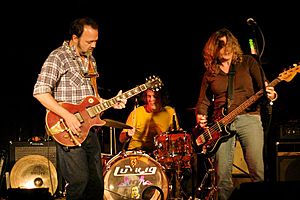Alternative country facts for kids
Quick facts for kids Alternative Country |
|
|---|---|
| Stylistic origins | Country music Neotraditional country Outlaw country Country rock Alternative rock Punk rock |
| Cultural origins | Late 20th century |
| Typical instruments | Guitar · Piano · Harmonica · Bass Guitar · Drums · Vocals · Banjo · Mandolin · Lap steel guitar |
| Subgenres | |
| Cowpunk | |
Alternative country (also called alt-country or Americana) is a special kind of country music. It features singers and bands that sound quite different from the usual mainstream or pop country music you might hear.
This style of music gets its sound from many different places. It mixes ideas from roots rock, bluegrass, rockabilly, Americana, honky-tonk, alternative rock, folk rock, and even punk.
How Alternative Country Started
In the 1990s, the name alternative country became popular. It was used to describe many musicians and singers who didn't follow the old rules of country music. They had a fresh, new sound.
Many of these artists did not spend a lot of money in big recording studios. This was different from the large country music industry at the time, which was mostly based in Nashville, Tennessee.
The songs in alternative country often talk about serious or sad topics. They can also be about social issues. These songs often come from the heart and avoid common phrases sometimes used by mainstream country artists.
The sound of alternative country can vary a lot. It might include old American folk songs, bluegrass, and other unique sounds. It's music that doesn't quite fit into mainstream rock or country.
Sometimes, it can be confusing because artists might not agree on what "alternative country" means. Some artists who are called "alternative country" don't want that label. Others who are more mainstream might say they are "alternative country." Even older musicians from the past are sometimes called "alternative country" today. A popular magazine about this music, No Depression, once said it covered "alternative-country music (whatever that is)."
Even with different ideas, most people agree that alternative country grew from traditional American country music.
Key Moments in History
In the 1980s, in southern California, some musicians started mixing country music with punk. This style was called "cowpunk." Bands like Jason and the Scorchers were part of this scene.
These different styles came together in Uncle Tupelo's important album, No Depression. It came out in 1990. Many people think it was the first true alternative country album.
Later, a magazine called No Depression was created. It was named after Uncle Tupelo's album and focused on alternative country music.
Uncle Tupelo made three more important albums. They even signed with a big record label. The band broke up in 1994. But the musicians from the band went on to start three other important alternative country groups: Wilco, Son Volt, and Bottle Rockets.
The Bottle Rockets, along with bands like Freakwater, The Old 97's, and Robbie Fulks, signed with an independent record label called Bloodshot in Chicago. They played a style of alternative country known as insurgent country.
Bands like Blue Mountain, Whiskeytown, Blood Oranges, and Drive-By Truckers continued this musical direction. However, by the 2000s, many of these bands started to sound more like rock music.
Images for kids
See also
 In Spanish: Country alternativo para niños
In Spanish: Country alternativo para niños
 | Janet Taylor Pickett |
 | Synthia Saint James |
 | Howardena Pindell |
 | Faith Ringgold |




